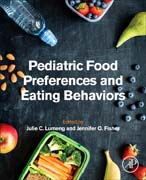
Pediatric Food Preferences and Eating Behaviors
Lumeng, Julie C.
Fisher, Jennifer O.
Pediatric Food Preferences and Eating Behaviors reviews scientific works that investigate why children eat the way they do and whether eating behaviors are modifiable. The book begins with an introduction and historical perspective, but then delves into the development of flavor preferences, the role of repeated exposure and other types of learning, the effects of modeling eating behavior, picky eating, food neophobia, and food selectivity. Other sections discuss appetite regulation, the role of reward pathways, genetic contributions to eating behaviors, environmental influences, cognitive aspects, the development of loss of control eating, and food cognitions and nutrition knowledge. Readers will find comprehensive chapters that conclude with recommended next steps. Delivers an up-to-date synthesis of the research evidence addressing the development of children's eating behaviors, from birth to age 18 yearsProvides an in-depth synthesis of the basic eating behaviors that contribute to consumption patternsTranslates the complex and sometimes conflicting research in this area to clinical and public health practiceConcludes each chapter with practical implications for practicePresents the limits of current knowledge and the next steps in scientific inquiry INDICE: 1. Development of Flavor Preferences2. Picky Eating, Food Neophobia, and Food Selectivity3. Appetitive Drive4. Satiety Responsiveness5. Food as an Addictive Substance6. Emotion and Eating7. Delay of Gratification for Food8. Food Cognitions9. Eating in the Absence of Hunger10. Food Craving11. Effects of Modeling of Eating Behavior12. Effects of Food Portion Sizes on Eating Behavior13. Repeated Exposure Effects14. Intentional Self-Regulation of Eating15. Parenting
- ISBN: 978-0-12-811716-3
- Editorial: Academic Press
- Encuadernacion: Rústica
- Páginas: 322
- Fecha Publicación: 20/07/2018
- Nº Volúmenes: 1
- Idioma: Inglés
